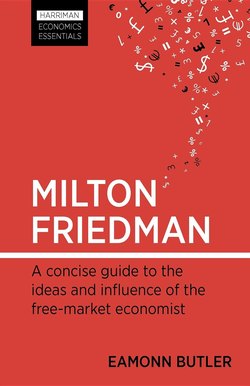Читать книгу Milton Friedman - Eamonn Butler - Страница 15
На сайте Литреса книга снята с продажи.
The Making of an Economist
ОглавлениеThough a staunch defender of free-market capitalism, Friedman came from a poor background. He was born in Brooklyn, New York, in 1912, to Hungarian Jewish immigrant parents. His father traded goods and took work as he could get it, while his mother sewed garments in a New York sweatshop. Some 68 years later, Friedman would take his Free to Choose television audience to exactly the same sort of workshop – this time in Hong Kong – to make the point that, while the pay and conditions might be poor, such places gave unskilled and often unloved immigrants their first step onto the ladder of self-improvement.
“My mother came to this country when she was 14 years old. She worked in a sweatshop as a seamstress, and it was only because there was such a sweatshop in which she could get a job that she was able to come to the US. But she didn’t stay in the sweatshop and neither did most of the others. It was a way station for them, and a far better one than anything available to them in the old country. And she never thought it was anything else. I must say that I find it slightly revolting that people sneer at a system that’s made it possible for them to sneer at it.”
– Milton Friedman, Playboy interview (1973)
From this foothold, the Friedmans were eventually able to move to a new home, 20 miles from New York, where they lived over the dry-goods store that his mother now ran while his father worked in New York. In Friedman’s early years, the family never earned enough to be above what today would be considered the poverty line; but through hard work they improved their lives.
Perhaps significantly for his subsequent career, Friedman’s parents spoke English, not their native Hungarian, in the home. Milton entered school earlier than most other children, and was a voracious reader. At 16, he won a scholarship to study mathematics at Rutgers University. And in addition to what he learnt in class, Rutgers also taught him something about the market. Freshmen at Rutgers were expected to wear green neckties: Friedman and a friend made some money by buying up a stock of these ties and selling them door to door. The next year they did a deal with Barnes & Noble to buy their classmates’ used textbooks and supply new ones.
But the big intellectual issue of the time was the stock market crash of 1929 and the Depression that followed it. Two of Friedman’s professors, Arthur Burns and Homer Jones, passed on to him their enthusiasm for how economics might explain these events and prevent them happening again. So Friedman turned to the study of economics.
He entered graduate classes at the University of Chicago, under the tutelage of the economists Jacob Viner, Frank Knight and Henry Simons – founders of what subsequently became known as the Chicago School of Economics, which was critical of the prevailing faith in government economic management. It was at Chicago that Friedman met his future wife, Rose Director, with whom he wrote a number of radical books on public policy, and who provided constructive criticism of nearly all of his professional economics works.
Friedman graduated in 1933, at the dawn of Roosevelt’s New Deal, with its large-scale public works projects aimed at creating new jobs, and high import tariffs aimed at preserving existing ones. Roosevelt’s expanding government was sucking in talented economists, and soon Friedman became one of them, joining the National Resources Committee in Washington. His research there on consumer behaviour gave him insights that would subsequently enable him to challenge Keynes himself.
